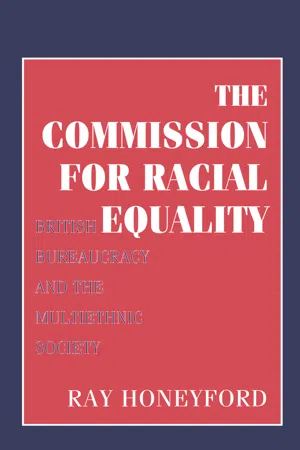
Commission for Racial Equality
British Bureaucracy and the Multiethnic Society
- 313 pages
- English
- ePUB (mobile friendly)
- Available on iOS & Android
Commission for Racial Equality
British Bureaucracy and the Multiethnic Society
About this book
In the United Kingdom, as in the United States, race relations are surrounded with taboos defined by the politically correct concepts of what Ray Honeyford calls the race relations lobby. This lobby, championed by the Commission for Racial Equality (CRE) has a vested interest in depicting the United Kingdom as a society rotten with endemic racism, and its ethnic minorities as victims doomed to failure. An outgrowth of the Race Relations Act of 1976, the Commission was founded in response to worthy concerns about race and patterned after its American prototype, the Congress of Racial Equality. Its constant demands for increased powers have only increased with the coming into power of the New Labour Party. That makes Ray Honeyford's critique all the more urgent. Honeyford exposes the policies and practices of the Commission to public view, encouraging informed debate about its need to exist. The CRE possesses considerable legal powers—powers which seriously undermine the great freedoms of association, contract, and speech as-sociated with the United Kingdom. Without denying the presence of racial prejudice, Honeyford shows that the picture of the United Kingdom as a divisive nation is a serious misrepresentation.
Placing the CRE in its historical and political context, Honeyford outlines its powers, and analyzes its formal investigations in the fields of education, employment, and housing. He also examines its publicity machine and its effect on public and educational libraries. He points out the danger of uncritically replicating the American experience. According to Honeyford, Americans have replaced a melting-pot notion of society, with all citizens loyal to a national ideal, with a "tossed-salad" concept which encourages the creation of self-conscious, separate, and aggressive ethnic groups, each claiming special access to the public purse, and having little regard for national cohesion and individual liberties.
Frequently asked questions
- Essential is ideal for learners and professionals who enjoy exploring a wide range of subjects. Access the Essential Library with 800,000+ trusted titles and best-sellers across business, personal growth, and the humanities. Includes unlimited reading time and Standard Read Aloud voice.
- Complete: Perfect for advanced learners and researchers needing full, unrestricted access. Unlock 1.4M+ books across hundreds of subjects, including academic and specialized titles. The Complete Plan also includes advanced features like Premium Read Aloud and Research Assistant.
Please note we cannot support devices running on iOS 13 and Android 7 or earlier. Learn more about using the app.
Information
Table of contents
- Cover Page
- Half Title
- Title Page
- Copyright Page
- Contents
- Introduction
- 1. The Commission for Racial Equality
- 2. The Race Relations Act 1976: The Background
- 3. The Race Relations Act 1976: Provisions and Effects
- 4. The CRE—Duties and Powers
- 5. The CRE in Action
- 6. Political and Economic Planning (PEP) and Race Relations
- 7. Education and the CRE
- 8. Employment and the CRE
- 9. Housing and the CRE
- 10. Publicity and the CRE
- 11. Libraries
- 12. Freedom of Association
- 13. Concluding Thoughts
- References
- CRE Reports and Papers
- Index